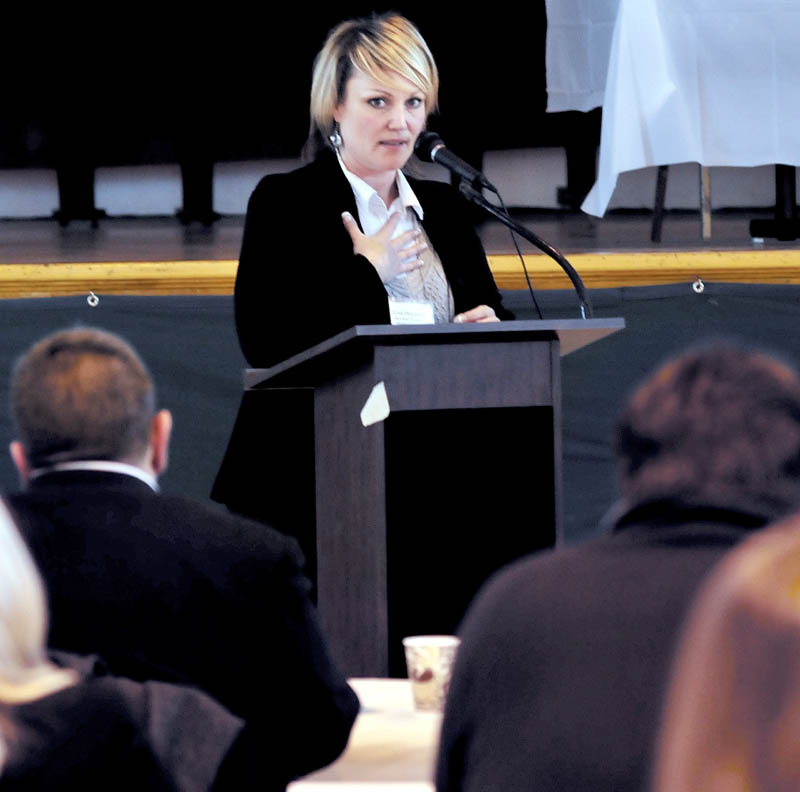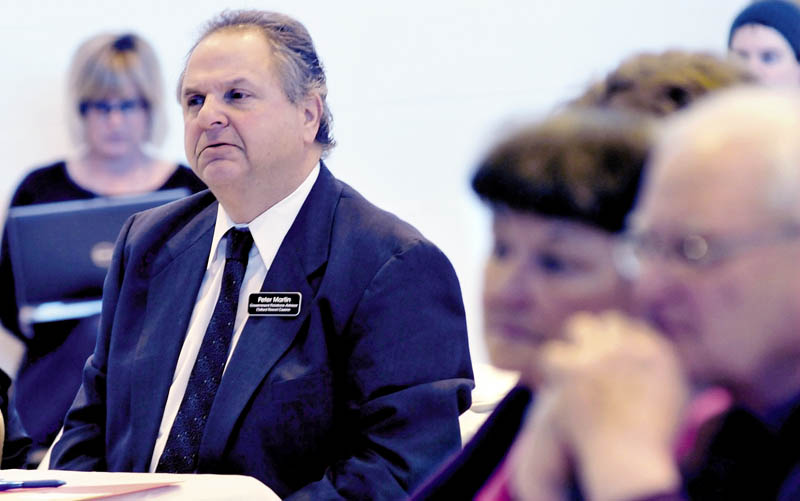WATERVILLE — Maine’s gambling industry plays a more proactive role in preventing gambling addiction than those of many other U.S. states, an expert on problem gambling said at a statewide conference yesterday.
Still, she said, Maine is on a path that will include more legalized gambling opportunities and more problem gamblers in the future.
Lesa Densmore, a former field hockey player for the University of Maine and recovered gambling addict, was the keynote speaker at Maine’s first Annual Conference on Problem Gambling Awareness, sponsored by the state Office of Substance Abuse and Mental Health Services.
Densmore’s own gambing addiction stripped her of her dignity and possessions, she said, during a downward spiral that began when she was a high school student athlete in Gardiner. Her problem grew while she was in her 20s; in the end, she lost her vehicles and her home and wound up living in a tent for eight months, she said.
Now Densmore travels the country, spreading awareness and education about the risks of gambling and a program she has developed to help combat the problem.
The event, held at the Waterville Armory, drew a crowd of about 50, mostly made up of people who have a professional connection to gambling addiction and its consequences.
Densmore said a national gambling industry worth billions of dollars is likely to grow, and that recent moves toward legalized online gambling in the United States will have dramatic consequences, in Maine and across the country.
“As soon as that happens, we’re going to see an epidemic with our youth,” she said.
Maine has trended slowly toward more legalized gambling ever since 1974, when its state lottery began.
In 2005, Hollywood Slots, now Hollywood Casino, opened in Bangor.
In 2010, voters cleared the way for the opening of the Oxford Casino; while in 2012, the state allowed Hollywood Casino to expand from slot machines to a full-service casino with table games.
Every year, the Legislature considers bills that would allow more charitable gaming, more or expanded casinos, or more legalized bets for harness racing or other sports.
Still, Densmore said, gambling in Maine is minor compared to gambling in states such as New Jersey, Nevada and Connecticut.
“It’s not even prevalent here, and the gambling industry has already decided to step forward, and I think that’s great,” she said.
In Maine, the same laws that allowed casinos to open their doors also required them to pay into funds for various purposes. In addition to funding the state’s gambling control board, public schools and harness racing, casino taxes also pay for resources to help problem gamblers.
Maine’s two casinos will pay about $100,000 this year into a fund to combat problem gambling in the state.
“I’ve talked all over the country to different gambling industries. They’re not all the same,” Densmore said. “There’s no universal feeling about gambling from state to state. This state is doing a great job — better than others.”
Maine’s fledgling casinos are ahead of other states’ casinos that don’t spend any money on the problem, she said.
In many states, “they want to stay completely away from the whole gambling piece,” she said. “That’s where I have the problem.”
Peter Martin, one of several owners of the Oxford Casino, attended the conference.
Martin said he felt that supporting awareness and treatment efforts are tied to the company’s long-term prospects in the state.
“It’s part of our longevity,” he said.
Martin also said that in Maine, problem gamblers can submit their names to an exclusion program, after which they will be barred from the casino.
Under the program, which is supported by the state’s gambling control board, “if people have a problem, they can come to us and get themselves excluded,” Martin said.
Similar programs exist in several other states, including Pennsylvania and New Jersey.
“I believe that if there’s going to be increases in opportunities for people to gamble, there needs to be increases in opportunties for people to get help,” Densmore said. “There needs to be an increase in awareness and prevention programs.”
She said the gambling industry has a level of responsibility and a role to play.
“If there’s going to be a profit made in an industry that is clinically recognized as having some addictive qualities, some of the profits should go toward helping with those programs,” she said.
Densmore praised the Connecticut State Lottery Corp. for an “amazing” advertising campaign that warned parents against buying lottery tickets as presents for children.
Michael Boardman, marketing manager for the Maine State Lottery, pointed to in-state marketing campaigns that warn problem gambling can happen to people from all walks of life. He said he supported the message in Connecticut that drew praise from Densmore and plans to contact the leadership there to talk about doing a similar campaign here.
Matt Hongoltz-Hetling — 861-9287
mhhetling@centralmaine.com
Send questions/comments to the editors.




Success. Please wait for the page to reload. If the page does not reload within 5 seconds, please refresh the page.
Enter your email and password to access comments.
Hi, to comment on stories you must . This profile is in addition to your subscription and website login.
Already have a commenting profile? .
Invalid username/password.
Please check your email to confirm and complete your registration.
Only subscribers are eligible to post comments. Please subscribe or login first for digital access. Here’s why.
Use the form below to reset your password. When you've submitted your account email, we will send an email with a reset code.